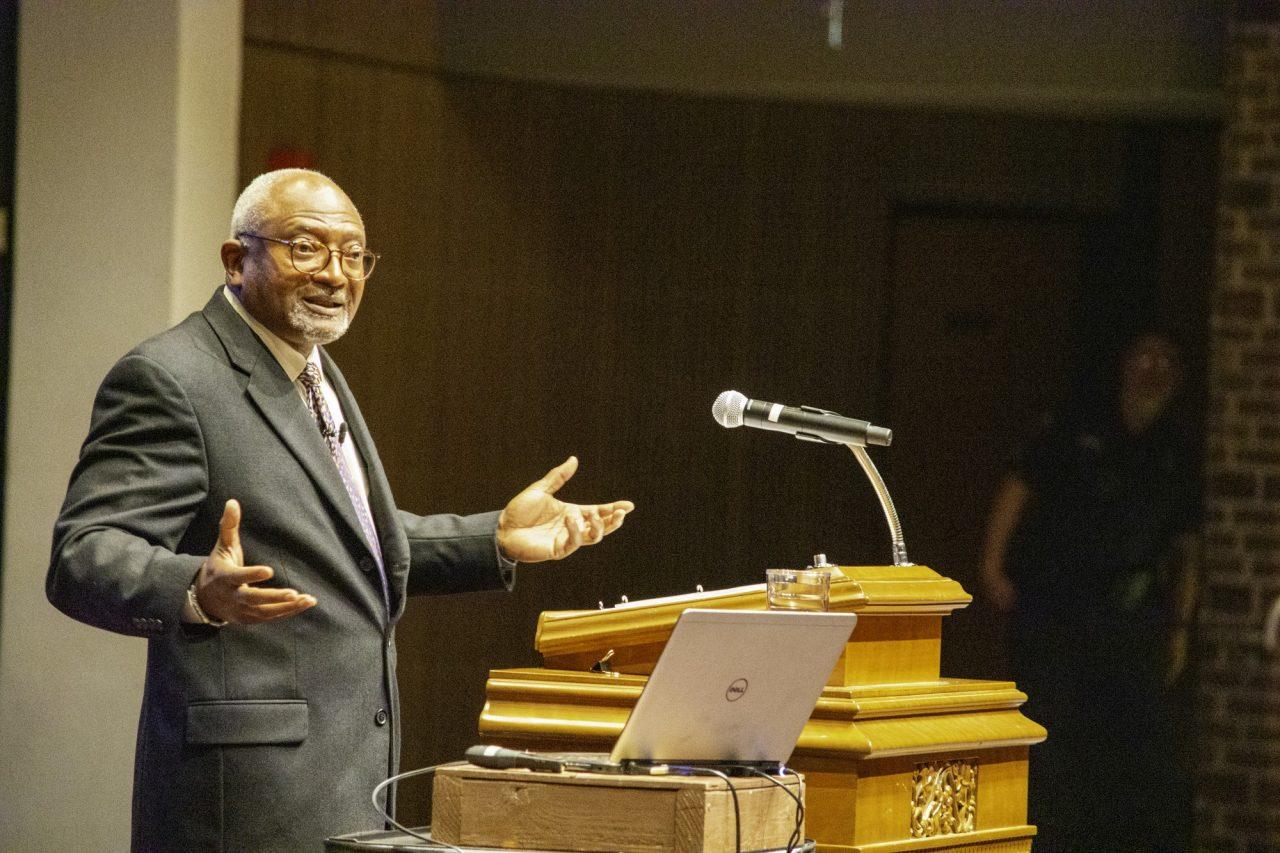Photo by Martina Almeida
Robert Bullard, an environmental sociologist known as the father of environmental justice, was this year’s Martin Luther King Jr. commemorative lecturer. His lecture on Jan. 23 took place in Laurie Auditorium, it centered around environmental racism and the way that people of color, particularly the Black community, are disproportionately located near landfills.
Bullard was selected through the collaborative efforts of faculty, staff and students in the MLK committee, a group housed in the Diversity and Inclusion Office. The committee puts together events for MLK week, including the MLK March. Bullard is a U.S. Marine Corps veteran and is a distinguished professor at Texas Southern University.
Rita Urquijo-Ruiz, professor of modern languages and literature, says the committee met in the fall to start planning the environmental justice theme for their programming.
“There was a lot of interest from the committee members to inquire about the possibility about bringing Dr. Bullard because environmental justice is an issue that affects all of us across the world, not just here in San Antonio and the U.S., but across the world. There was so much excitement to be able to go about the theme and then to see who we were going to bring,” Urquijo-Ruiz said.
While planning, Urquijo-Ruiz believed it was important that the potential lecturer address issues affecting communities of color.
“We wanted someone that could be effective in terms of bringing together the theme of what the MLK lecture is about. It’s usually something to do with justice and our communities of color and especially African-Americans and Afro-Latinas and -Latinos,” Urquijo-Ruiz said.
Erin Kramer, professor of history, similarly believes Bullard was a great fit because of his work’s relevance to San Antonio’s immediate community.
“For a long time, environmentalism was thought of as being conservation and protection of wilderness. His work and the work of all those studies, as he said in the lecture, really emphasize that no, the environment where we live is the air that we breathe and it’s not just protecting forests far away; it’s making sure that all people have clean water and clean air for one thing. But also that we’re not dumping pollution disproportionately in communities of color, which of course we are,” Kramer said.
“For a long time, environmentalism was thought of as being conservation and protection of wilderness. His work and the work of all those studies, as he said in the lecture, really emphasize that no, the environment where we live is the air that we breathe and it’s not just protecting forests far away; it’s making sure that all people have clean water and clean air for one thing. But also that we’re not dumping pollution disproportionately in communities of color, which of course we are,” Kramer said.
For Kramer, who teaches courses in Native American history, Bullard’s work is relevant to all communities of color.
“Native communities are one of the many communities that have been disproportionately affected by environmental racism. His work is not just relevant to African-American communities; it’s a broad swath of communities of color and working class too,” Kramer said.
As for how Bullard’s environmental justice journey began, he very earnestly explained to the audience that his wife Linda surprised him with a rigorous task.
“She said, ‘Bob I have sued the state of Texas.’ I said, ‘You did what?’ She said, ‘Yeah I sued the state because the state is anticipating to grant a permit for a landfill that’s being located in the middle of a predominantly Black middle-class suburban neighborhood,” Bullard said.
Linda further explained that she needed Bullard to begin researching and create a map locating all the landfills in Houston and the demographics of the people living near them.
“I need somebody to do a study and collect data to help me go into court in two weeks to defend this temporary restraining order,” Robert said, quoting his wife.
Bullard went into his university class the next day and informed his students they had a new research project: collecting data on landfills around Houston. The results of their research helped Bullard’s wife challenge environmental discrimination using civil rights law.
“Five out of five of the city-owned landfills were in Black neighborhoods. Six out of eight of the city-owned incinerators were in Black neighborhoods. Three out of four private-owned landfills were in Black neighborhoods. Eighty-two percent of all the garbage waste dump in Houston were dumped in Black neighborhoods even though Blacks made up only 25 percent of the population in 1978,” said Bullard.
Bullard has written 18 books since, including “The Wrong Complexion for Protection,” “Dumping in Dixie” and “Highway Robbery.” He said, however, that they all hold the same core values.
“I’ve written 18 books, but it’s just one book; don’t tell anybody. The central core of all of the books that I’ve written can be summarized into fairness, justice and equity. Where you live can impact your quality of life and can also impact your access to opportunity,” Bullard said.







